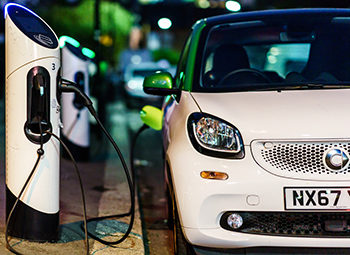Zero-carbon goods and services need to be at the heart of UK growth


In the coming years the UK will be competing in a race between economies to become cleaner, smarter and more efficient. The prize? The lion’s share of growing markets for zero-carbon goods and services. The UK needs to be strategic in how it participates in this race at it could influence both the country’s economic trajectory and the example it sets to others in pursuing decarbonisation alongside growth.
Earlier this year, the UK became the first major economy to enter into law a commitment to achieve net-zero annual emissions of greenhouse gases by 2050. With this target the concept of sustainable growth – which has been around for years – has been thrown into the spotlight. The target represents not just a milestone for the UK’s international leadership on climate change but also an opportunity to drive UK growth through investment, innovation and creativity.
A question of policy
Setting down the net-zero target sends a strong, clear and credible signal. Now, policy must go further. The Government can create value-adding opportunities for UK companies with the right policies and by strategically identifying where the UK can be competitive across the value and innovation chain. For instance, the UK’s successes in offshore wind has created business opportunities for UK-based service providers and utilities as well as turbine manufacturers and designers in Europe.
The UK can foster growth opportunities by ensuring policies help rather than hinder zero-carbon goods and services. For instance, in the context of electric vehicle charging infrastructure and storage, a growing number of UK-based companies are developing turnkey charging products, purchasing components from overseas and then assembling them under particular configurations so they can be sold to consumers as ready-to-use charging products. Investor interest in these companies, as exhibited by the recent £25m equity injection into Zenobe, indicates their potential to sustain quality jobs in the coming years. Detailed specifications for charging infrastructure under the Autonomous and Electric Vehicles Act need to ensure they do not stifle the business models under development by UK firms.
Considering global – not just territorial – emissions
On a global level, the goods and services that the UK exports contribute to greenhouse gas emissions – and thus decarbonisation efforts – around the world. In greenhouse gas accounting terms, the UK’s net-zero commitment applies to what are known as ‘territorial emissions’. These are production-based estimates that do not take into account the emissions associated with the overseas usage of goods and services produced or developed by the UK. Therefore, the Government is not ‘on the line’ for these emissions under its obligation to reach net-zero. But the UK’s continued innovation and diffusion of goods and services that enable emissions overseas could encourage others to follow suit; and raise awkward questions about its claims to be a leader in decarbonisation.
Take the example of finance. London’s financial services sector is rightly recognised for its role in greening finance. However, index provider FTSE Russell recently reneged on a decision to categorise oil and gas as ‘non-renewable’, reportedly due to the London Stock Exchange’s desire to list Saudi Aramco. The UK’s financial services sector should instead use its influence to engage with the assets it invests in, and to develop a considered pathway away from financing fossil fuels.
Combining efforts to reorient the economy
Reorientation of the economy needs to occur through a combination of efforts from business and government, as well as academia and civil society. Academics need to engage in the policymaking process by analysing the effectiveness of mechanisms to decarbonise and suggesting pathways forward. Civil society will be critical in holding business and government to account, as evidenced by the youth climate strikes and Extinction Rebellion’s effectiveness in increasing public demands for decarbonisation. If this can be achieved, the UK could set an example to others in a ‘whole economy’ approach to decarbonisation. From the Government’s perspective, orienting industrial policy levers such as R&D tax credits, export finance and technical assistance to support zero-carbon goods and services is a good starting point.
If the UK fails in this reorientation, it is likely to miss a critical growth opportunity. Both global and domestic demand is expected to pivot away from carbon-intensive alternatives in the coming years. Given the Government’s desire to shape economic growth through the Industrial Strategy, zero-carbon goods and services need to be placed meaningfully at the heart of policymaking in the coming years.
The Grantham Research Institute’s report on goods and services related to passenger vehicles will be published early in 2020.
A version of this commentary was originally published in Business Green

